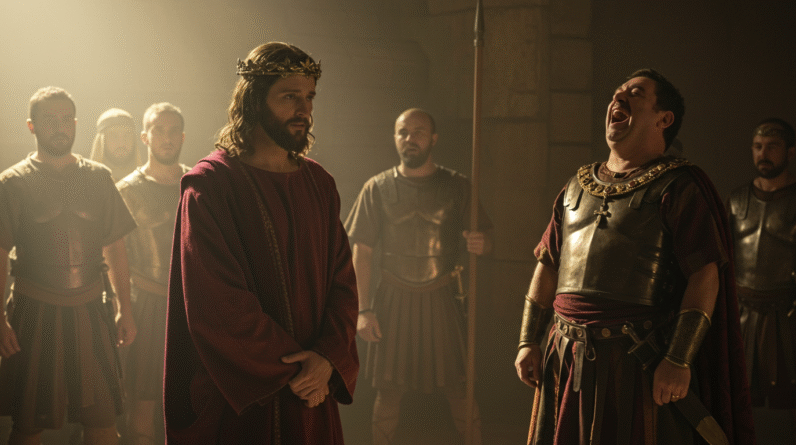Explore King Saul’s tumultuous journey, caught between ambition and divine command. A compelling narrative of power, pride, and the consequences of defying God’s will.
King Saul’s Struggle Against God’s Will
King Saul – The Opponent of God in the Old Testament

Introduction
Do you ever wonder what happens when one’s desires clash with divine directives? This age-old question brings us to the intriguing life of King Saul, whose reign and decisions highlight a poignant struggle against God’s will. King Saul, the first king of Israel, is a figure wrapped in the complexities of pride, power, and spiritual deviation. Throughout the Old Testament, his narrative provides a rich tapestry of leadership marred by disobedience and conflict with divine instruction. This article delves into Saul’s opposition to God, his defining actions, the resulting consequences, and the profound lessons we can extract from his story.
Who Was King Saul?
Saul’s journey from a promising beginning to a tragic downfall is a compelling narrative. As the first king of Israel, Saul was chosen to unify the tribes of Israel and lead them against their enemies. Living during the 11th century BCE, he began his reign with promise and humility, depicted as a tall and handsome young man from the tribe of Benjamin. Saul’s ascent to the throne marked a significant moment in biblical history as Israel transitioned from a confederation of tribes to a centralized monarchy. His life and reign are crucial to understanding Old Testament events, setting the stage for subsequent kings, and shaping the future dynamics of Israel’s relationship with God.
King Saul’s Opposition to God
Saul’s opposition to God emerged from a mix of personal insecurities, pride, and a desire for control. His motivations often underlined a struggle with accepting divine authority, leading him to rely on his judgment over God’s commands. The pressure of kingship, coupled with his flawed nature, drove key decisions that reflected this inner struggle.
A significant act of opposition involved Saul’s unauthorized sacrifice before a battle against the Philistines. Instead of waiting for the prophet Samuel as instructed, Saul took matters into his own hands 1 Samuel 13:13-14. Another pivotal moment was his partial obedience in the battle against the Amalekites. God commanded Saul to completely destroy the Amalekites and all they possessed, yet Saul spared King Agag and the best of the livestock, justifying it as a pretext for sacrifice to God 1 Samuel 15:9. These acts of defiance directly conflicted with God’s expressed will and exposed Saul’s inability to adhere to divine instructions fully.
The Consequences of His Opposition
Saul’s repeated disobedience prompted severe consequences, altering his fate and standing before God. The most immediate result was God’s rejection of Saul’s kingship. The kingdom was promised to another, a man after God’s own heart, David 1 Samuel 15:28. This divine judgment marked the beginning of Saul’s downfall, leading to a life filled with paranoia and conflict.
Saul’s narrative warns of the perils of placing personal desires above divine commandments. His downfall illustrates the biblical teaching that obedience to God surpasses sacrificial offerings 1 Samuel 15:22.
King Saul in the Larger Biblical Narrative
King Saul’s story is interwoven with various significant figures in the Bible, notably David, who becomes his rival and successor. Saul’s jealousy and attempts to thwart David’s ascension are well-documented and feature prominently in biblical accounts. These interactions underscore the destructive power of envy and fear, highlighting Saul’s inability to recognize and accept God’s unfolding plan 1 Samuel 18:9. Despite his rebellion, Saul’s reign played a vital role in God’s redemptive blueprint by setting the stage for David’s rule, which ushered Israel into a period of prosperity and divine favor.
Lessons We Can Learn from King Saul
From Saul’s life, we gain valuable insights into human nature and our spiritual journeys. His story illustrates the dangers of pride, disobedience, and self-reliance over divine guidance. As modern readers, we are reminded of the importance of humility, obedience, and the need to align our will with God’s. Saul’s life serves as a cautionary tale demonstrating the spiritual and personal consequences of straying from divine paths. His narrative warns us to heed God’s instructions and avoid the pitfalls of jealousy, insecurity, and the pursuit of personal glory over divine purpose.
Conclusion
To recapitulate, King Saul is a figure of complexity, embodying a tragic resistance against God’s will. His reign is marked by a series of choices that illustrate the harsh realities of disobedience and its repercussions. Saul, though beginning with promise, becomes a cautionary beacon highlighting the importance of obedience and humility in faith.
In reflecting on Saul’s life, consider how the struggle against God’s will resonates with your spiritual journey. How can the lessons from Saul’s disobedience guide us today in nurturing a closer, obedient relationship with God? Engage with these reflections, and let Saul’s story inspire vigilance and humility in your faith journey.
Acknowledgment: All Bible verses referenced in this article were accessed via Bible Gateway (or Bible Hub).







